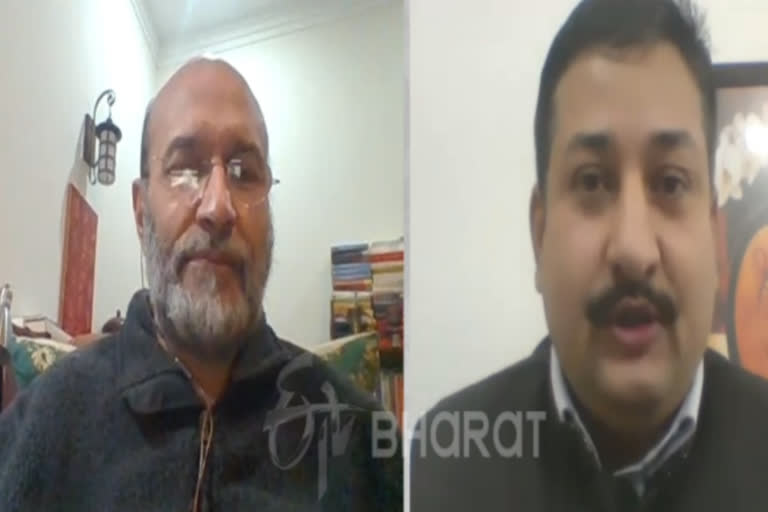New Delhi:The country has already lost a lot of time due to the government’s policy of extending credit support to stimulate a failing economy, which did not produce the desired result in absence of large-scale cash transfers to the vast majority of India’s poor people that was essential for boosting the demand, said a top economist.
The government should transfer minimum cash to 40% the country’s population and provide more money for improving the efficient use of water in agriculture in the next year’s budget even at the cost of PM Kisan Samman Nidhi scheme or fertiliser subsidy for farmers, says Santosh Mehrotra, a New Delhi based human development economist.
"We have already lost a lot of time so the budget must increase the public investment significantly," Santosh Mehrotra told ETV Bharat in an exclusive interview.
Mehrotra says the government needs to borrow more to increase the public spending and put more money directly into the hands of the public.
"The government must seriously consider a cash transfer to the poor," he said.
Mehrotra says the government does not need additional money for cash transfer as it can utilise the budget allocation for PM Kisan Samman Nidhi to reach out to even a larger number of beneficiaries by widening the criteria.
"All the major economists in the world are recommending a cash transfer or minimum income guarantee," said the economist. "I'm just talking about giving Rs 500 a month to 40% of the poor people in both rural and urban areas."
He says cash transfer to senior citizens, widows, differently-abled persons under the PM Garib Kalyan scheme announced in March last year was not enough.
Under the PM Garib Kalyan, the Centre transferred cash subsidy to 20 crores (20 million) women PM Jan Dhan account holders, and also to other vulnerable groups such as senior citizens, widows and other differently-abled persons as a part of its strategy to ensure basic food, fuel and some cash in their hands during the lockdown period. The scheme ended in November last year.
Rural Employment Guarantee
The economist also criticised the government for not making a substantial increase in the allocation for the rural guarantee programme (MGNREGA) to provide a livelihood to hundreds of millions of returnee migrant labourers.
Like several other economists, Mehrotra also urged the government to expand the NREGA to urban areas.
"It will bring back workers to urban areas where they are actually needed."
He, however, cautions that the government should focus on promoting the construction work, affordable housing in tier-II, tier-III and tier-IV towns instead of metros as these large cities are already over-congested.
In order to provide short-term employment to returnee labourers, finance minister Nirmala Sitharaman announced an additional allocation of Rs 40,000 for the MGNREGA in the current fiscal, taking the total allocation to over Rs 1 lakh crore.
However, the actual increase in the MGNREGA expenditure this year over the expenditure would only be to the tune of Rs 30,000 crore as according to the revised estimates, the government spent Rs 71,000 crore in NREGA last year against the budget estimate of Rs 60,000 crores.
Mehrotra says local bodies must be strengthened for expansion of employment guarantee in urban Centres.
Sudden lockdown destroyed economy
Santosh Mehrotra says more than the pandemic, a hastily announced and poorly implemented lockdown, destroyed the economy and livelihoods.
“We need to separate the impact of the pandemic and the impact of lockdown on the economy and livelihoods,” he said.
“This is why the contraction of the Indian economy in the first and second quarter of the current fiscal was worse than any other country in the G20,” said the economist.
Mehrotra says a country like South Africa, with just one-twentieth of the population, gave four-days notice and in India, the lockdown was introduced with just four-hour notice.
"Even the states were taken aback," he told ETV Bharat.
Mehrotra underscores the several problems with the lockdown: it was too sudden with no room for planning; it was implemented earlier than required as there were less than 600 cases in the country, and a national lockdown was not needed as most of the cases were confined to 9 cities having international airports.
Citing a study conducted by the Oxford University, Mehrotra says India's lockdown was the strictest lockdown that brought down the entire economy to a standstill and economy collapsed.
Mehrotra, who has done extensive work in the field of human development, employment and rural livelihood, says despite a projected GDP growth of 9-10% in the next fiscal, the per capita GDP will not come back to the level of 2019-20 before March 2023.
Falling per capita GDP
According to the first advance estimate of the GDP growth for the current fiscal, India's per capita GDP in the current fiscal will fall below Rs 1 lakh in four years.
"As a result of this and contraction of jobs and decline in wages which is already happening, there will be a very sharp increase in poverty," Professor Mehrotra told ETV Bharat.
He also highlights the sharp contrast between the massive job losses in the formal and informal economy at a time when corporate earnings during the lockdown increased significantly.
